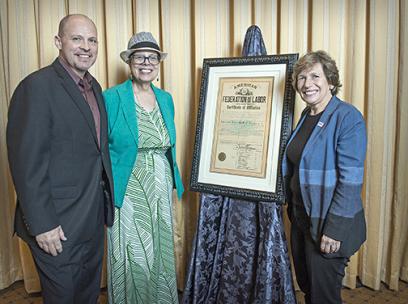Honoring our past and inspiring our future
The American Federation of Teachers reached a significant milestone this week: the centennial of our founding. As I've pored over historical documents from our archives, it's clear that, from generation to generation, our union has been a vehicle to fight for positive change both in public schools and in society. As we enter our second century, we remain fiercely committed to creating educational opportunity, building professional voice and agency, and advancing economic, racial and social justice for all.
The seeds of teacher unionism were sown in the late 19th century, with teachers like Henrietta Rodman, who helped found a teachers union in New York City and led the fight to allow women teachers to keep their jobs when they married or had children. In Chicago, Margaret Haley worked through her local union to challenge pervasive poverty, teachers' lack of resources and low pay, and a curriculum imposed by bureaucrats. Recognizing the strength they would have as affiliates of a national union in a larger labor movement, in 1916 both women's unions joined with five other local unions to form the American Federation of Teachers.
Then, as now, working people had many reasons to be angry. The AFT has worked to channel the aspirations underlying that anger into positive action. From the start, our leaders have known that power is necessary to bring about change, and that working people build power through their collective action at the ballot box and the bargaining table and through their skills, knowledge and ideas.
For 100 years, the AFT has worked to build power and use it for good. In the 1920s, the AFT lobbied Congress for children's rights, improved teacher salaries and programs to combat adult illiteracy. We have continued that work. For example, in 2015, as Congress worked to reauthorize the primary federal education law, AFT members took more than 120,000 online actions and met face to face with legislators to help shape the law so it could have the potential to give educators the voice and resources they need to give children the education they deserve.
The AFT has grown to include other school employees, professors, government workers, nurses and healthcare professionals, and early childhood educators. While the AFT and the larger labor movement grew, so did America's middle-class and working families' standard of living. The labor movement helped ensure that working people, not simply special interests, had power in our democracy. Collective bargaining provided AFT affiliates leverage to advocate for quality, agency and voice on the job—the embodiment of our motto: "A union of professionals."
The AFT has also used collective action to advance racial and social justice. As early as 1918, the AFT demanded equal pay for African-American teachers and lobbied for equal educational opportunities for African-American children. In 1953, the AFT filed an amicus brief in support of the plaintiffs in the Brown v. Board of Education case before the Supreme Court, the only educational organization and union to do so. Hundreds of AFT members traveled south in the 1960s to register new African-American voters and teach in AFT-run Freedom Schools. Today, the AFT is working to attract and retain teachers of color and to promote racial equity in education, the economy and criminal justice. And we stand up against bigotry in all its forms.
The AFT's greatest strength has always been our members, professionals whose skills, knowledge and ideas both strengthen, and are strengthened by, their union. The AFT's Share My Lesson is the fastest-growing free digital collection of resources for educators. The AFT Innovation Fund cultivates promising union-led ideas to strengthen public education. Our student debt clinics have helped members sharply reduce crushing college debt. And AFT members—from registered nurses and adjunct professors to paraprofessionals and parole officers—practice solution-driven unionism, using our expertise to improve the quality of our work.
You don't hit 100 without some setbacks. Austerity has caused harmful cuts to public education and services throughout our history. Wisconsin Gov. Scott Walker and other governors intent on destroying any curb on their power have waged war on public sector unions. Many elected officials have sought to destabilize public schools and services in order to promote flawed privatization schemes.
It's all the more reason to honor the example of the AFT's founding mothers and fathers, to take our anger, build on our aspirations, and channel them into action—for our cause, our country and our members, and for those we serve and those who will follow. From one generation to the next, we are honoring our past and inspiring our future.

